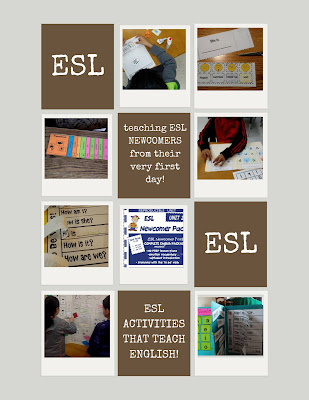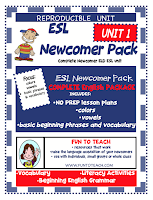13 ESSENTIAL TIPS FOR
CLASSROOM TEACHERS WITH ENGLISH LANGUAGE LEARNERS
Buddy
up!
 From
the very first day find a buddy or buddies for your ELL student. Buddies can orient the student to the school,
play at recess, or work together with the ELL on class assignments and
projects. Student to student interaction
builds a sense of belonging and community.
From
the very first day find a buddy or buddies for your ELL student. Buddies can orient the student to the school,
play at recess, or work together with the ELL on class assignments and
projects. Student to student interaction
builds a sense of belonging and community.
Use
technology!
Google
translate, books on tape, and the wide variety of free phonics programs make
learning fun!
Bring
out your best charade moves!
Model
and demonstrate what you want the student to do. Repeat the directions slowly or have a buddy
repeat classroom directions. Be
redundant in the way you present information.
Gestures, actions, pictures, objects and writing are all great
communication tools to use. Choose and
few and use them regularly. Check for
understanding frequently.
By
Consistent!
Create
a variety of simple clear instructions, routines, procedures and
expectations. Using these consistent
cues will offer predictably and comprehension for students learning English.
Don’t
hesitate to talk!
Speak
to the student directly throughout the day.
Don’t worry if the student does not respond verbally, listening is
learning for the ELL student. Remember
that learning is taking place even if the ELL does not speak for the first
weeks or months. Provide opportunities
throughout the day for teacher to student interaction. Don’t let your English learner be a wallflower! Bring ELLs into your classroom community with
lots of direct teacher talk and eye contact!
Be
patient!
When
the student does not understand, say less and simplify your speech.
Write
it up!
Post
written objectives, vocabulary, and assignments. Preview and review and allow plenty of time
to practice new vocabulary in authentic classroom situations
.
 | |
| Click on the cover to try our Newcomer Packs for free! |
Hang
it up!
Create
and use visual demonstrations during your lessons. Drawings, charts, maps, graphic organizers
and pictures. Hang them up to increase
comprehension of the lessons you teach.
Get
hands-on!
Use
manipulatives. Students learn without
language when teachers offer learning through hands-on activities.
Highlight
it!
Highlighting
vocabulary, important words or summarizing sentences are great ways of
modifying assignments for ELLs. English
learners can understand difficult passages by identifying simpler language
within the text that clarifies the meaning.
Show
what you know!
ELLs
can communicate by labeling, drawing, copying, and underlining. English learners can create outlines, make
charts, diagrams and pictures to demonstrate their understanding and knowledge.
Speak
up when you don’t know!
Teach
your ELLs what to do when they don’t know.
Instruct ELLs how to ask a buddy, raise a hand or call the teacher when
they don’t understand what to do. Modeling
works great to make sure ELLs know how to ask for clarification.
Collaborate!
Communicate
with ELD teachers for advice and assistance in creating a learning environment
for your ELLs. Classroom teachers with
experience teaching English learners can be a wealth of knowledge. Tap into their counsel.
Lori


No comments:
Post a Comment